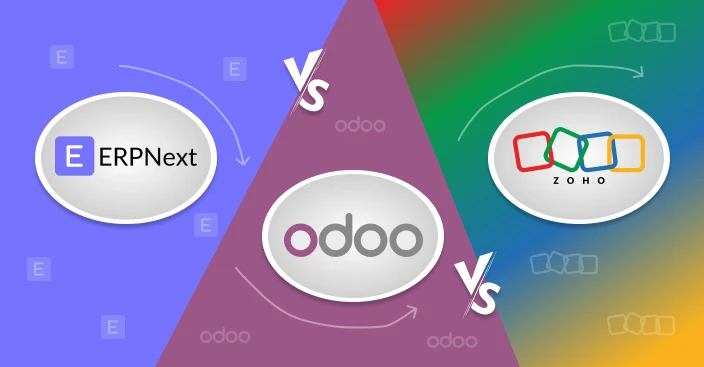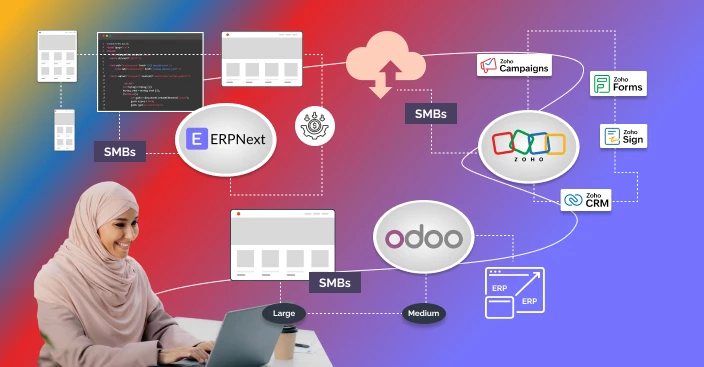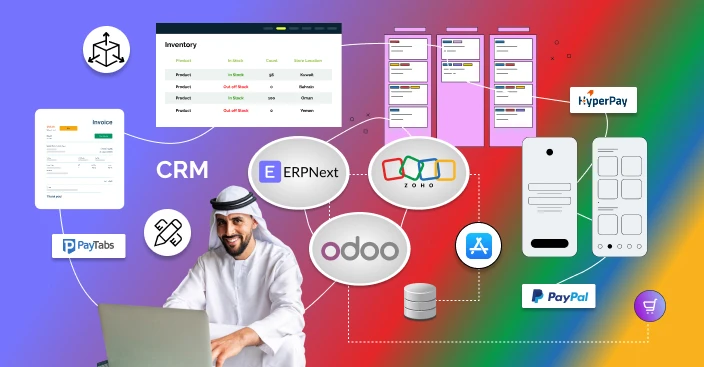The Ultimate Guide to Choosing Between ERPNext, Odoo, and Zoho for Saudi Businesses

Table of Contents
Saudi business is no longer all about having a great product or service. With the Kingdom racing to Vision 2030, digitalisation is no longer a choice—it’s a must.
From preparing with e-invoicing under ZATCA to coping with the ever-increasing manpower, businesses require strong ERP (Enterprise Resource Planning) solutions to keep it rolling smoothly, scalable, and future-proof.
However, many organisations are perplexed when it comes to selecting the best ERP platform for their specific needs.
ERPNext, Odoo, and Zoho are among the most popular platforms in Saudi Arabia, but each has unique strengths, shortcomings, and fits for different kinds. With expert consultation, it’s possible to choose the best ERP platform that caters to your business needs.
Let’s dive into each of these three platforms separately, looking at their features, simplicity, customisation, pros, and cons, as well as best applications for Saudi businesses.
The Saudi Arabian ERP market
The Saudi Arabia ERP market is expanding at a phenomenal rate driven by digital transformation initiatives and regulatory requirements.
The value of the ERP market in the Kingdom stood at USD 173 million in 2023 and will be USD 469 million by 2030 with a 15.3% CAGR growth (Grand View Research). This is an indication of how critical ERP solutions are to big, medium, and small companies.
ERPNext, Odoo, and Zoho have three very different strategies: open-source price, modular scalability, and cloud-first simplicity. Let us take a closer look.
Feature Comparison
Modules Provided
They all do the fundamentals—Accounting, Inventory, HR, CRM, Manufacturing, and Project Management—but with varying completeness.
The ERP comes with a wide array of features out of the box, without charging extra for licensing. For little and medium enterprises in Saudi Arabia, practising trade or retail, and hiring professional ERPNext services would thereby mean that even the “all-in-one package” concept would be affordable.
Being ZATCA compliant with its release upgrades, it’s the best candidate to satisfy Saudi VAT and e-invoicing obligations.
Odoo is scalable. You can start with the partial implementation of invoicing and CRM, and then supply chain management, manufacturing, and eCommerce interfaces. With over 1,000 live stores of Odoo in Saudi Arabia (Store Leads), we can understand that firms here are embracing its scalability.
Zoho differentiates itself, however, for SMEs focused on services. It has Zoho Books, Zoho People, and Zoho Inventory as part of its portfolio, each of which supports and overlaps with the others.
With over 100 million global users and MENA being one of its fastest-growing markets, Zoho has come to develop a compelling case for cloud-first deployment.
Customisation & Flexibility
The greatest advantage of ERPNext is that it is open-source. Saudi businesses that must configure ERP software to fulfil regional requirements (e.g., bilingual English-Arabic company processes or custom HR settings) can configure the software without needing to pay huge licensing fees.
Odoo is also extremely flexible. Its modularity and robust partner ecosystem enable Saudi makers, sellers, and logistics suppliers to bolt on only what they need.
Even most Saudi companies benefit from Odoo’s local data centre in Dammam, which ensures data compliance as well as reduced latency.
Zoho solutions adapts mainly within its own sphere. Though easy to install, it might not be enough for those organisations that have very specialised workflows (e.g., sophisticated industrial manufacturing).
Yet for consulting or marketing businesses, etc., its pre-configured functionality can solve most demands without the necessity of writing custom code.

User Interface & Experience
Zoho is best at simplicity—its cloud software is end-user focused and thereby maximally utilised in SMEs where fast adoption with minimal capital training cost is imperative.
Odoo’s mature look is distracting once additional modules are added. More sophisticated businesses in Saudi Arabia find themselves paying for employee training or having this sophistication addressed by Odoo partners.
ERPNext, although operational, is at times criticised as being less sophisticated. Organisations that deploy ERPNext in Saudi Arabia tend to respond to such by citing the cost advantage and adaptability it offers.
| Feature / Dimension | ERPNext | Odoo | Zoho |
| Licensing & Cost | Open-source, no licensing fees; only hosting, support, and development costs. | Subscription-based, modular pricing; costs increase with more users and modules. | Subscription-based; affordable at the entry level, but total cost rises with add-ons and more users. |
| Customisation & Flexibility | Very high (open-source, fully customisable); ideal for businesses with in-house IT or local partners. | High, modular architecture with many third-party apps and a strong partner network in Saudi Arabia. | Moderate; customisation mainly within the Zoho ecosystem, less suited for highly complex workflows. |
| Modules Offered | Core ERP modules (Accounting, HR, CRM, Manufacturing, Inventory, Projects) are included by default. | Wide range of modules covering everything from CRM to eCommerce, manufacturing, and advanced supply chain. | Strong in service and back-office modules (CRM, Accounting, HR, Projects, Inventory); manufacturing is less robust. |
| User Interface & Experience | Functional but less polished; requires training for smoother adoption. | Polished UI, but complexity increases with multiple modules; training is often needed for large teams. | Very user-friendly; designed for SMEs and non-technical users; minimal training required. |
| Integration Capabilities | API-based integrations; limited ready-made connectors compared to Odoo/Zoho. | Excellent; integrates with payment gateways, eCommerce platforms, and logistics providers; strong ecosystem. | Seamless integration across Zoho apps; connectors available for popular third-party apps. |
| Localisation & Compliance | Supports Saudi VAT & ZATCA e-invoicing through customisation and community updates. | Saudi-compliant with local data centre in Dammam, ensuring compliance and low latency. | VAT-ready and supports Arabic/RTL; some advanced ZATCA needs may require third-party connectors. |
| Deployment Options | Cloud or on-premise; can be hosted locally in Saudi. | SaaS, cloud, or on-premise; it now offers Saudi-based hosting for compliance. | Cloud-first; primarily hosted on Zoho servers outside Saudi Arabia. |
| Ecosystem & Partner Network (Saudi Arabia) | Smaller but growing partner network; requires skilled developers for support. | Large and active local partner ecosystem; strong presence in the Saudi market. | Growing presence in MENA; fewer local partners compared to Odoo, but expanding steadily. |
| Scalability | Good for SMBs and mid-sized firms; large enterprises may face limitations. | Very strong scalability; suited for medium to large enterprises. | Ideal for SMEs; less suited for very large or highly complex organisations. |
| Best Fit (Use Case in KSA) | Affordable choice for SMBs (retailers, trading firms) seeking customisable ERP with ZATCA compliance. | Manufacturing, retail, logistics, and enterprises need scalability, integrations, and local hosting. | SMEs and service-driven businesses (consulting, marketing, agencies) are seeking ease of use and fast deployment. |
Integration Capabilities
ERPNext integrates very well with third-party applications through APIs, but is less sophisticated with connectors than Odoo and Zoho offer.
Odoo is strong in facilitating integration with logistics companies, e-commerce websites, and payment processors—most critical for Saudi businesses, which are manufacturing and retail-based.
Saudi manufacturing businesses leveraging Odoo have even seen the decline of scrap rates by 5–12%, up to 25% enhancement in timely delivery, and decreases in the carrying cost of inventory by 15–20%.
Zoho has the advantage of interoperability among its 55+ apps and thus is appealing to organisations already committed to the Zoho environment. In third-party apps, it supports connectivity but at times at extra charges.
ERPNext, Odoo, and Zoho: Pros and Cons
ERPNext
- Pros: Affordable (open-source), support for ZATCA compliance and seamless ZATCA integration, highly customisable for local requirements.
- Cons: Smaller support community in Saudi Arabia, harder learning curve, can be bogged down by very big businesses.
Odoo
- Pros: Modular and scalable, established local partner network, Saudi data centre, ideal for retail and manufacturing.
- Cons: Less easy to personalise, unknown third-party module quality, potentially expensive.
Zoho
- Pros: Straightforward, cloud-first, integrated app ecosystem, fast-growing in MENA.
- Cons: Less ideal for sophisticated manufacturing, limitations on customisation, dependent on Zoho’s cloud infrastructure.

Best Use Cases
ERPNext is best suited for small to medium-sized Saudi companies, i.e., Riyadh- or Jeddah-headquartered trading firms or shops, who need a cost-effective ERP but not at the expense of VAT and ZATCA compliance.
Odoo would be most suitable for advanced organisations of a medium to large size. For instance, a manufacturing business in Dammam has operations running in various warehouses. It would be ideal for them to use Odoo as it is scalable and locally hosted in Saudi Arabia.
Zoho is perfect for Riyadh SMEs and start-ups, and also for service firms and consultancies. Its cloud-first approach and availability with Zoho CRM are perfect for companies that seek ease of use and flexibility over deep customisations.
Final Words
In Saudi Arabia, choosing an ERP platform is not feature-matching—it’s choosing a system which aligns with your business goals, regulatory needs, and future expansion.
ERPNext provides affordable, open-source capability for small and medium-sized businesses that require flexibility and ZATCA compliance at less than stratospheric licensing fees.
Odoo ERP is suitable for mid-size to large enterprises, and it features modular scalability, a strong local partner ecosystem, and models for Saudi hosting that allow for compliance and performance needs.
Zoho is suitable for SMEs and service businesses needing ease of use, simple deployment, and seamless cloud integrations.
With Saudi Arabia’s ERP market projected to grow almost twice by 2030, now’s the time to take the leap—choosing the right ERP can be equal to not only running ops successfully, but also growing in Saudi Arabia’s digital-first economy in the long term.
Each business is unique, and the appropriate ERP platform will also depend on its specific project needs. Book a free consultation with an ERP expert and understand the right ERP platform that caters to your unique business needs.
FAQs
 What ERP is most cost-effective for Saudi companies?
What ERP is most cost-effective for Saudi companies?
ERPNext is typically the cheapest since it’s open source, but Odoo and Zoho could have higher ROI at scale.
 Do all three systems offer Saudi VAT and ZATCA compliance support?
Do all three systems offer Saudi VAT and ZATCA compliance support?
Yes, but ERPNext and Odoo might need to be done through a partner. Zoho Books is VAT-capable but might need to be equipped with connectors for more advanced ZATCA requirements.
 Which ERP best suits Saudi manufacturing?
Which ERP best suits Saudi manufacturing?
Odoo is the most suitable, with ROI being reported for Saudi manufacturing firms.
 Is Zoho appropriate for large enterprises?
Is Zoho appropriate for large enterprises?
Zoho is better suited for SMEs. Large-scale established firms in Saudi Arabia can use Odoo or ERPNext for their growth needs.
 Can ERPNext, Odoo, or Zoho be hosted locally in Saudi Arabia?
Can ERPNext, Odoo, or Zoho be hosted locally in Saudi Arabia?
ERPNext can be hosted locally through self-hosting, Odoo has a data centre in Saudi Arabia, while Zoho is cloud-hosted outside of the Kingdom primarily.



